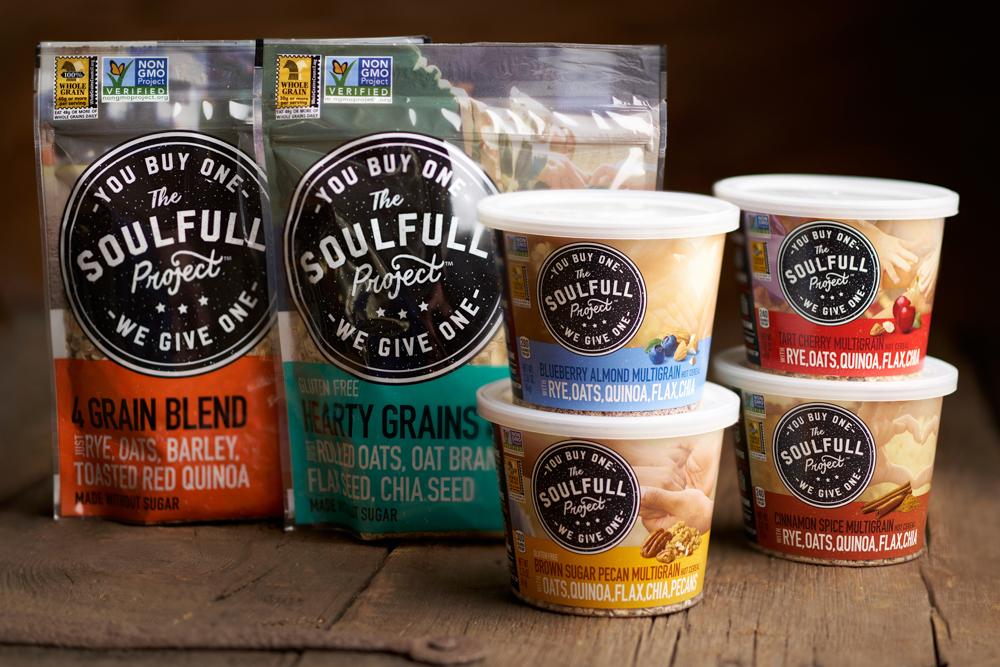The Soulfull Project was born from a very personal commitment from four friends, to put healthy food on the tables of hungry families—a calling that drives every step the Camden, NJ-based company takes.
For every single serving of hot cereal—Whole Grain Stamp approved, Non-GMO Project Verified concoctions of steel cut oats, quinoa, barley, chia seeds, flax, nuts and dried fruits—the Soulfull Project donates a single serving of 4-grain cereal to a regional food bank. The “You Buy One, We Give One” strategy has succeeded mightily since the company’s launch in August 2016. That’s due, said head of business and operations Megan Shea, to a need people have to connect and give back to their communities in a meaningful way—made easy in this case through their routine purchases.
“We believe everyone should have the same quality food,” she said. “It’s not always easy to find healthy breakfast options, and we added valuable ingredients to enhance the nutritional impact.”
Enthusiastic support from Campbell’s
Campbell Soup Company has played a pivotal role in the Soulfull Project’s inauguration and ongoing success. As employees of Campbell’s, Megan and Chip Heim were canvassing homes to survey eating habits, when they visited a home in Texas where a single mother and her three children had literally nothing to eat—not even, yes, a can of soup. They made a promise to themselves to help solve this need; but a year went by, and when another single mom with children knocked on their office door in New Jersey, asking for food, they remembered the promise. The Soulfull Project was born that night, and Campbell employees Maria Gamble and Lisa Schipsi signed on, completing the “formidable four.”
For ten months, the four worked on their own time to develop a business plan. When they pitched the idea to Campbell’s, it was enthusiastically embraced, from CEO Denise Morrison on down.
“It really fits their purpose,” Megan said. “They were also impressed with our passion. None of us had ever started a business before, so while challenging and scary at times, the process has also been completely exhilarating.”
The company is a wholly owned subsidiary of Campbell’s and a Certified B Corporation, a for-profit company that has been verified to meet rigorous standards of social and environmental performance, accountability, and transparency.
“We really serve two masters,” Megan said. “We have to deliver on our message, while returning value. We knew from the start we had to strategically build this into our business model.”
Campbell’s provides the office space, does the accounting, and offers advice on food quality and safety. But the operation runs independently, and on a different marketing model.
Regional Food Banks: the perfect giving partner
The products—four hot cereal cups and two multi-serve bags (one of the cups and one bag is gluten-free) are sold at 64 Wegmans stores in the Northeast. Variety pack boxes are a recent rollout. Expansion plans are underway involving new retailers and distribution channels. The linchpin is penetration through connections with regional food banks—the Project donated 100,000 servings of cereal in the first year, to 57 food banks.
“We first presented our idea to the Food Bank of South Jersey; we expected a ‘no’, but they loved the idea,” Megan said. “Food bank recipients—40 million Americans—are mostly employed people with families. Children and seniors are particularly at risk of food insecurity. The food banks helped guide the development of appropriate donations from the Project, suggesting a non-sugar, multi-use food since many of its clients suffer from diabetes. They helped develop the 4-grain family-sized bag, suitable for a hearty breakfast but also useful in other recipes.”
Sharing the vision: fulfilled purchaser, well-nourished neighbor
The goal is to provide healthy food. “Obtaining Non-GMO Project verification was important to our target consumers, so we made it a priority when we developed the product— in fact, it was one of the first decisions we made. The butterfly logo is a key label they look for.”
Support for the mission from suppliers has also been significant. “We have been fortunate to find suppliers and partners providing high quality ingredients that meet our standards. One of the biggest challenges we face, like most startups, is that our initial orders are very small; our partners are patient as we begin to scale.”
As they move past their first year, Soulfull’s team members will no doubt keep donning more hats to solve the challenges of “growing out.” That’s been another reward. “We never aspired to be entrepreneurs,” Megan said. “We just wanted to personally make a difference in people’s lives.”





